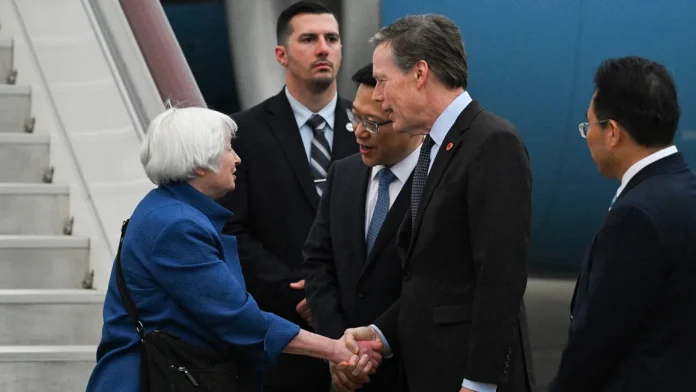US Treasury Secretary Janet Yellen on Friday urged China to address overcapacity, which she said could lead to global economic disruption, and create a level playing field for US companies and workers, New York Post reports.
During her five-day visit to China, the secretary plans to hold talks with senior Chinese officials that will address overcapacity and what the US considers unfair Chinese trade practices. She said at an event hosted by the American Chamber of Commerce in China in Guangzhou:
There are a broad swath of economic interactions between the US and China that should remain uncontroversial.
However, she said, there are “Chinese practices that are a drag on US companies.” Yellen, the first Cabinet official to visit China since President Joe Biden met Chinese leader Xi Jinping last November, previously told the Guangdong governor that open and direct communication on divisive issues is important for the US and China. She added:
This includes the issue of China’s industrial overcapacity, which the United States and other countries are concerned can cause global spillovers.
After meeting with the governor, Yellen spoke with US business leaders at an American Chamber event and answered their questions in the auditorium of a marble-clad conference centre in Guangzhou’s Baiyun district. Yellen said at an event hosted by the American Chamber of Commerce in China on Friday afternoon:
I’ve heard from many American business executives that operating in China can be challenging.
Citing a recent House survey that found a third of US companies in China said they had faced unfair treatment compared to local competitors, Yellen said the US has seen China “employ unfair economic practices, including creating barriers to entry for foreign companies and taking enforcement actions against US companies.” She claimed in her speech:
I strongly believe that this doesn’t only hurt these American firms: ending these unfair practices would benefit China by improving the business climate here. I intend to raise these issues in meetings this week.
Earlier in the day, the minister also met with American, European and Japanese businesses to discuss their concerns.
Guangzhou is the capital of Guangdong province, China’s manufacturing and export centre, home to telecommunications giant Huawei and BYD, China’s largest electric car maker.
Huawei has been hit hard by US restrictions on semiconductor exports to China. Government subsidies and other support measures have encouraged solar panel and electric car makers in China to invest in factories, creating far more production capacity than the domestic market can absorb.
Large-scale production has driven down costs and unleashed price wars for green technologies, a boon for consumers and efforts to reduce global dependence on fossil fuels.
But Western governments fear that this capacity will flood their markets with low-priced exports, threatening American and European jobs.
Eswar Prasad, a trade professor at Cornell University, expects Yellen to press Beijing to boost domestic consumption and ensure fair competition in new technology sectors, especially green energy and electric cars, as well as adequate market access for US companies. He said:
Concerns about China attempting to export its overcapacity and simultaneously making a big push into these sectors will be top of mind for the US delegation.
Beijing has countered concerns about overcapacity raised by the US and Europe. Foreign Ministry spokesman Wang Wenbin said earlier this week that China’s growing exports of electric cars and solar panels were promoting green energy development worldwide and were the result of the international division of labour and market demand. He said the US was interfering with free trade by restricting technology exports to China. Wenbin added:
As for who is doing non-market manipulation, the fact is for everyone to see. The US has not stopped taking measures to contain China’s trade and technology. This is not de-risking, rather, it is creating risks.
Yellen said at the US Chamber event that “overcapacity is a problem shared by many countries, advanced and developing, and it’s nothing new.” She added:
This is not anti-China policy. It’s an effort for us to mitigate the risks from the inevitable global economic dislocation that will result if China doesn’t adjust its policies.
Scott Paul, president of the Alliance for American Manufacturing, which unites businesses and the US Steelworkers union, told The Associated Press before Yellen’s trip that “there are limited expectations about the Chinese government and its response; one thing that Yellen hopefully can and should say is that the US is prepared to use all the policy tools available to us to ensure that China’s industrial overcapacity does not negatively harm our economic and national interests”.
In February, the Alliance released a report stating that the introduction of low-cost Chinese cars into the US market “could be an extinction-level event for the US auto sector.”
